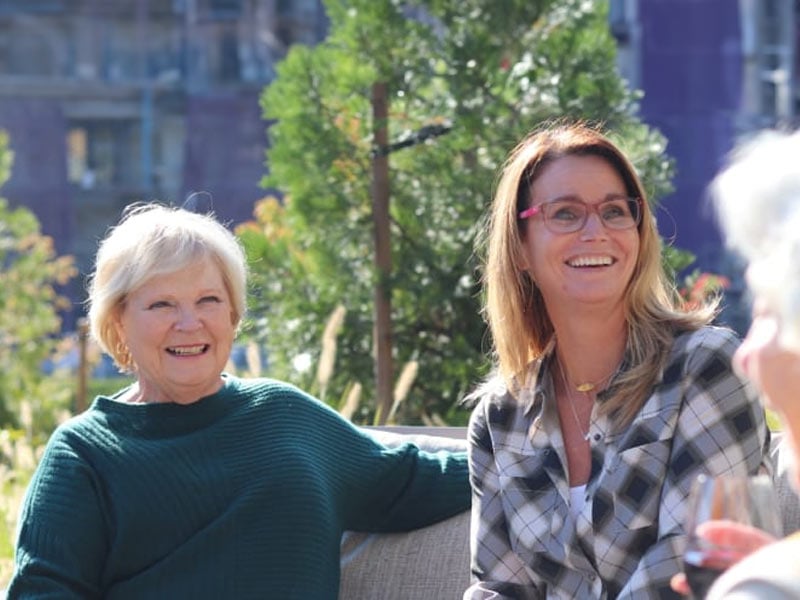Positive attitudes about aging may be the secret to living long and healthy lives - an actual Fountain of Youth!
Researchers believe that positive thinking about aging can increase a person's will to live, making him or her more resilient to illness and more proactive about health. Another explanation is that the mental stress of aging is lower for people who have a positive attitude.
You are what you think you are when it comes to aging. Seniors who think of age as a means to wisdom and overall satisfaction are 40 percent more likely to recover from a disability than those who see aging as synonymous with helplessness or uselessness, according to The Journal of the American Medical Association.
Between 1900 and 2000, average life expectancy increased by nearly 30 years in the United States and most other developed countries of the world. For the first time in history, most people being born now can expect to live seven, eight, nine, or more decades, according to the World Health Organization. This achievement changes not only the trajectory of individual lives but also the shape of societies: Adults 60 and older are now the fastest-growing segment of our population.
There is a growing body of impressive research showing that our attitudes toward aging affect our health, our resilience in the face of adversity, and our very survival. Becca Levy at Yale, a pioneer and leading researcher in this area, conducted a study that followed several hundred adults (50 years and older) for more than 20 years. She and her colleagues found that older adults who held more positive age stereotypes lived 7.5 years longer than their peers who held negative age-related stereotypes.
How can you age well, or support your aging loved ones? There are many empty promises to the fountain of youth but by following these 4 Guidelines, you may unleash a positive attitude and a healthy, happy life along the way.
- Get Enough Sleep: You should snooze for seven to nine hours each night, according to the National Sleep Foundation. Getting less than the recommended amount of sleep puts you at a higher risk of obesity, heart disease, and diabetes. As it turns out, “beauty sleep” is not a myth. During sleep, your body releases a growth hormone that helps restore collagen and elastin, the essential building blocks of young, healthy skin! Recent studies have also shown a connection between insomnia and accelerated aging of the brain. In other words, chronic lack of sleep adversely affects your brain’s function and speeds up the aging process.
- Exercise Regularly: Staying active is a vital part of aging well. The average woman can lose 23 percent of her muscle mass between ages of 30 and 70, according to the National Academy of Sports Medicine. You lose muscle more rapidly as you age, but exercise—resistance workouts in particular—can increase mass and strength, even well into your 90s. Staying fit may also reduce age-related memory loss, according to a study published in the journal Frontiers in Aging Neuroscience. Alzheimer’s disease accounts for approximately 60 to 70 percent of all dementia cases. Staying active is not just good for your body, but your mind as well, as it strengthens the hippocampus, the region of the brain associated with learning.
- Eat Well: Nutrition plays a major role in how your body ages. The Cleveland Clinic recommends adding fiber to meals with food such as whole grains, and raw fruits and vegetables. Reduce your cholesterol and fat intake and make smarter choices by enjoying or preparing food with healthy fats, such as olive oil, avocados, salmon and walnuts. Avoid “white foods” like bread, rice and potatoes, which provide no long-term nutritional value. Watch out for overeating, which may lead to a shorter life span, cardiovascular disease, and type 2 diabetes, according to the NIH. Stick to a balanced diet. The old “Healthy Eating Pyramid” has been replaced by the “Healthy Eating Plate” that consists of vegetables, healthy proteins, whole grains and fruit. Take the time to eat your meal sitting down, chew slowly, and stop when you’re full.
- Stay Social and Connected: Staying in touch with friends and relatives can help you live longer. Aging adults with strong social ties were shown to have a 50 percent higher chance of living longer than those with poor or insufficient relationships, according to a study published in the journal PLoS Medicine. Maintaining meaningful relationships and making time to enjoy others’ company, in person and not just online, helps us feel connected, which is what makes us human after all!
You’re never too young- or too old- to make these changes. Even waking up each day with a new outlook and positive mindset will take you further than you were the day before. By making these changes, or supporting your loved one to make these changes, you will both be off on the adventure of a lifetime- unlocking the Fountain of Youth that was within you all along.













